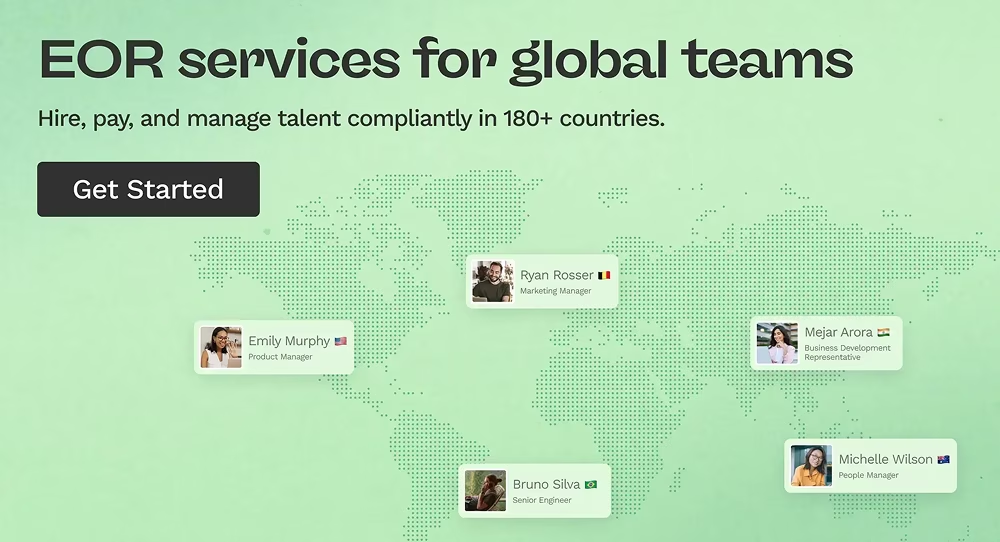For many global companies, Spain ranks high on the list of places to hire. But the logistics can be a major roadblock. Between worker classification, tax filings, and localized contracts, setting up to hire in-country is no simple task.
The good news? You don't need to be an expert in Spanish labor laws or even establish a legal entity to make your first hire. Partnering with an employer of record (EOR) lets you offload the legal and administrative heavy lifting, including onboarding, processing payroll, and ensuring your company is compliant.
In this guide, we’ll explain how to hire Spanish talent with an employer of record in Spain and how to make the process a pleasant one from the start.
3 benefits of hiring in Spain
When you hire internationally, you gain access to a wider talent pool that allows you to build a more diverse team with unique backgrounds and skills. Every country brings something unique to the table, but Spain’s workforce stands out for three key reasons:
1. Highly skilled talent
Spain is home to many talented, highly educated job seekers. With its growing tech scene, the country offers a strong pipeline of developers, engineers, systems architects, and data analysts. It’s also a global business hub, thanks to its trade agreements with Latin America, the Middle East, and beyond—so you’ll also find skilled finance and business professionals.
2. Competitive labor costs
Compared to other European Union countries like Germany and France, Spain has a lower cost of living, and most salaries reflect that. For many foreign employers, this means access to top talent at competitive rates that remain fair within Spain’s economy.
3. Widespread multilingualism
While Castilian Spanish is the official national language, many professionals in Spain are fluent in English. If your workforce or clients operate primarily in English, your new Spanish hires will have no trouble communicating well.
What to know before hiring in Spain
Anyone considering hiring in Spain, even with support from an employer of record (EOR), should understand the basics of local labor laws. Before extending an offer to a Spanish employee, keep the following in mind:
Mandatory written employment contracts
In Spain, all employees must receive a written employment contract for all indefinite roles, fixed-term work lasting over four weeks, or any project with a defined scope. This rule applies to both full-time and part-time positions. Failure to clearly outline the terms and conditions can result in fines.
A Spanish employment contract should include:
- Basic personal and contact information
- A job description
- Details about compensation and employee benefits (including overtime pay)
- Working hours
- Legally required terms like vacation days and tax obligations
- Termination and notice period guidelines (typically 15 days)
- A confidentiality clause
Social security and tax obligations
Spanish employers must contribute to social security on behalf of their workers monthly. Before onboarding employees, employers must register with the local tax agency. They must also register each employee and report any changes to their employment status over time.
Any hiring entity in Spain also has to withhold the appropriate income tax from employee paychecks. Regional regulations and the employee’s individual tax bracket determine this amount.
Paid leave and benefits requirements
Spanish employees are entitled to at least 30 calendar days of paid leave annually. Employees also receive 16 weeks of maternity or paternity leave and paid sick leave, though the duration of the latter depends on the nature and severity of the situation.
Spanish companies must also provide employees time off for the country’s 14 annual public holidays, nine of which are federal.
Severance pay
In Spain, severance pay equals 20 calendar days of salary for each year an employee has worked at the company. The total amount cannot exceed the equivalent of a year’s salary, regardless of how long they’ve been with the organization. Employees who face unfair dismissal may receive higher severance payouts than the standard amount.
5 steps to hiring in Spain through an employer of record
The idea of managing social security contributions or drafting employment contracts that meet Spanish regulations may seem overwhelming. Fortunately, working with an EOR relieves you of much of the pressure. Here’s how to start the process:
1. Choose a trusted employer of record
Partner with a reliable EOR that has proven experience managing global hiring and payroll. Your company’s compliance depends on the EOR’s handling of Spanish employment laws.
With Oyster, you’ll receive expert guidance on local regulations, compliant onboarding, seamless payroll support, and timely payments to your Spanish employees, all while ensuring accurate tax withholding and benefits management.
2. Define the role and employment terms
Once you’re set up with an EOR, you’re ready to make your first Spanish hire. Write a job description that outlines the role, salary range, hours, benefits, and requirements. Post it on employment sites to let candidates know you’re legally able to hire in Spain.
3. Let the EOR handle contracts and onboarding
Your EOR will manage the onboarding process and draft compliant employee contracts that meet Spanish labor laws. Oyster uses automated workflows to collect signatures and build the employee’s file. You can also share company-specific documentation, like handbooks or training manuals, within this process.
4. The EOR runs compliant payroll
Your EOR will also handle payroll, ensuring that your employee receives compensation accurately and on time. Oyster calculates wages in euros, applies local and federal tax withholdings, and documents every step so that you always have comprehensive compliance records.
5. Focus on the human aspect of HR
With legal and payroll logistics covered, your HR team can focus on supporting your new hires. Thanks to your EOR, you can spend more time providing one-on-one training, helping them integrate well with their teams, and gathering feedback to continually improve the employee experience.
Why use an employer of record
Partnering with an EOR is one of the most reliable and stress-free ways to onboard talent and run payroll internationally. But beyond ease and peace of mind, there are several other benefits to consider:
Simplified HR operations
EOR platforms like Oyster do more than help companies hire talent. They streamline everyday HR processes, from automating payroll to securely storing employee data and ensuring timely paychecks. Many EORs also offer self-service features that improve the employee experience by allowing workers to request time off, view pay stubs, and update personal info without needing to go through HR.
Lower risk of misclassification
Misclassification happens when a company treats a contractor like an employee—by requiring a fixed schedule or assigning them a manager, for example. This can result in serious compliance issues and costly penalties. EORs help you properly classify each worker under local employment laws to keep you compliant from day one.
Better control over intellectual property
IP is a vital business asset, but if your agreements aren’t airtight, you risk losing control. An EOR provides guidance on IP protections to help you establish clear terms with both employees and contractors. That way, your company retains rights to all designs, inventions, and proprietary work.
Simplify hiring in Spain with Oyster as your employer of record
Expand your global reach and hire the best talent possible without borders. With Oyster, you can confidently grow your team in Spain and beyond.
Oyster’s EOR services go far beyond paperwork and payroll. You’ll receive expert guidance on hiring in over 180 countries and support every step of the way, from handling social security benefits to managing a global team. Book a demo today to learn how Oyster can transform your People Ops and make your next Spanish hire a success.

About Oyster
Oyster is a global employment platform designed to enable visionary HR leaders to find, engage, pay, manage, develop, and take care of a thriving distributed workforce. Oyster lets growing companies give valued international team members the experience they deserve, without the usual headaches and expense.
Oyster enables hiring anywhere in the world—with reliable, compliant payroll, and great local benefits and perks.




.webp)

.avif)


.avif)




_Leader_Leader%201%20(2)%20(3).svg)
_Leader_UnitedKingdom_Leader%201%20(1).svg)
_Leader_Europe_Leader%201%20(1).svg)
_Leader_Mid-Market_Leader%201%20(1).svg)
_Leader_Small-Business_Europe_Leader%202%20(2).svg)
_Leader_Small-Business_Leader%201%20(1).svg)
_FastestImplementation_Small-Business_GoLiveTime%201%20(1)%20(1).svg)